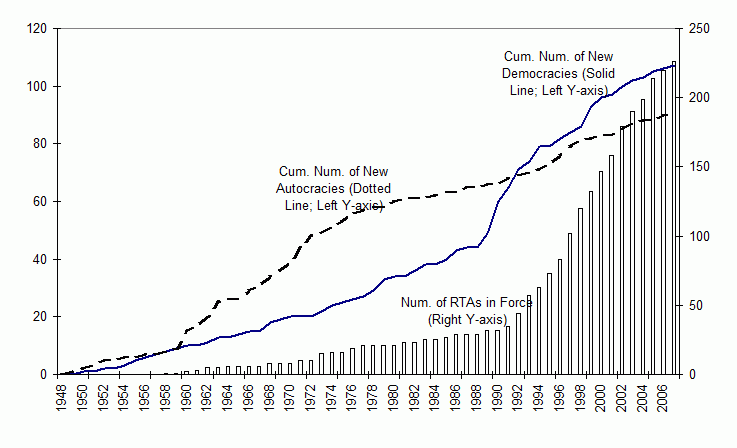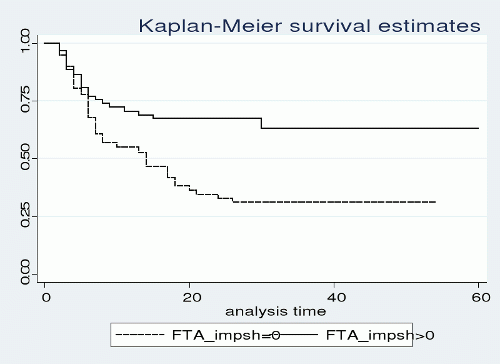“Striking down trade barriers is critical to sustaining democracy […] throughout the region.”
Former US President George W Bush, April 2001.
When the US announced the intention to pursue a free trade agreement with Central American countries, one of the three explicit goals was “to support democracy in the region”. The demand of Eastern and Central European countries for membership in the EU has similarly been linked to the countries’ democratic concerns. In fact, governments often declare “promoting democracy and political stability” as a central force behind their decision to form regional trade agreements (WTO 2011). Of course, this may just be mere rhetoric. But maybe there is some truth in it.
Consider Figure 1. The bars show the cumulative number of free trade agreements (FTAs) in force, while the solid line shows the cumulative number of transitions to democracy throughout the world since 1948. Both trends have accelerated since the early 1990s. The dotted line shows instead the cumulative number of transitions to autocracies; this trend has visibly slowed down since the 1980s. We argue that these phenomena are not independent from each other.
Figure 1. Number of free trade agreements in force and cumulative number of new democracies and of new autocracies (1948-2007)
Notes: “New democracy” is defined as a change from a non-positive to positive score in the database known as polity2; “New autocracy” is defined as a change from a positive to non-positive polity2 score.
In recent research (Ornelas and Liu 2011), we present evidence that participation in free trade agreements can destroy protectionist rents. They can also serve as commitment devices to destroy future protectionist rents. Since such rents are attractive for autocratic groups, FTAs can lower their incentives to seek power. While this has little value in established democracies, where the rule of law is strong and the risk of authoritarian disruption is negligible, it can be important for unstable democracies. These threatened states should therefore have an extra incentive to seek involvement in FTAs, over and above the incentive stemming from the agreements’ potential trade gains.
We provide the theoretical basis for our claims by extending the trade integration model of Ornelas (2005) to allow for endogenous changes in the political regime. At any trade regime domestic firms exchange contributions for protection with the government, which cares about national welfare and the contributions it receives. Key to understand the impact of an FTA is the recognition that the equilibrium external tariffs change with the constraint imposed by the agreement on the internal tariffs. Taking this into account, it can be shown that even though an FTA still permits lobbying for protection against excluded countries, the volume of protectionist rents falls after the formation of the agreement.
In a dynamic setting this implies that, all else equal, groups motivated mainly by office rents will have lower incentives to seek power if the country is deeply engaged in FTAs. Authoritarian groups tend to fit this description best. After all, due to their aptitude to resort to violence to keep power, authoritarian groups have less incentive to pursue policies that favour the population at large than democratic ones. If the gain of authoritarian groups from keeping power falls when the country is engaged in FTAs, but the costs and risks from attempting a coup d’état are unaltered by the agreements, the likelihood of democratic failure will therefore be lower if the country participates more intensively in FTAs.
Accordingly, if the incumbent government in an unstable democracy realises this effect of “democratic consolidation,” it will seek participation in FTAs more actively than it would otherwise. The reason is two-fold.
- First, an FTA will weaken the authoritarian threat, increasing the likelihood of democracy survival.
- Second, even if the dictatorial group takes control despite the FTA, the agreement will constrain its rent-extraction activities. Hence, unstable democracies tend to enter in FTAs more frequently than other countries, all else being equal.
Does the data back it up?
It is always possible, of course, to construct models that deliver strong theoretical results. But are the model’s predictions validated empirically? A first step toward testing our hypotheses is a non-parametric survival comparison between democracies with and without FTA partners. We use a dataset that includes 126 countries over 1948-2007. As Figure 2 illustrates, and a statistical test confirms, democracies without FTAs (dotted curve at the bottom) are unequivocally more likely to fail than those with FTAs (solid curve on the top).
Figure 2. Non-parametric survival curves for countries with and without FTAs
Notes: The curve on the top is the survival curve for countries with strictly positive FTA import shares. The curve at the bottom is the survival curve for countries with no FTA imports.
While striking, this result may be due to other differences between democracies with and without FTA partners. Thus, we also carry out a detailed econometric analysis. We rely on the strategy pursued by Persson and Tabellini (2009), who estimate the likelihood of democratic breakdown employing the concept of “democratic capital”. The domestic component of democratic capital takes into account the history of democracy in the country, while its foreign component considers current levels of democracy abroad. Along with other covariates, these two components of democratic capital allow us to estimate the likelihood of democratic failure in a country. Employing duration analysis techniques, we find that greater participation in FTAs significantly reduces the probability of democratic breakdown; i.e., FTAs contribute to the “consolidation” of democracies. This helps to explain why democratic experiences have been particularly successful since the late 1980s.
Having estimated the likelihood of democracy failure, we use its fitted values to estimate changes in FTA participation. In doing so, we consider only the portion of the likelihood that is not predicted by FTA participation. We find that a higher level of regime uncertainty indeed induces democratic governments to seek greater participation in FTAs. This helps to rationalise the outbreak of regionalism since the early 1990s, when many countries with limited democratic experience became involved in FTAs.
Our empirical results are robust to different econometric specifications and to different measures of democracy. The results are also economically meaningful. For example, Mongolia’s hazard rate in 2005 would drop from 3% to 1% if it had the same level of FTA participation as Chile, or to just 0.3%, had Mongolia the same FTA import share as Mexico.
Free trade and political freedom
Our analysis also indicates that the rent destruction forces of FTAs are important drivers of the results. For example, our predictions hold consistently for agreements where most of the trade among the involved parties is liberalised. By contrast, the estimates are generally indistinguishable from zero for partial-scope agreements signed under the Enabling Clause of the GATT, which allow for many exceptions, and therefore impose few restrictions on the availability of rents from protection. It is also possible that FTAs help to maintain democracies not because of their rent destruction effects, but because of pressure from more democratic FTA partners. While this is a very plausible alternative mechanism, our empirical tests suggest that FTAs with more democratic partners are as valuable for the sustainability of a country’s democracy as FTAs with less democratic partners.
While all this is “good news” for democratic countries involved in FTAs, we must stress that participation in FTAs is, unsurprisingly, no panacea. They can help to consolidate democracies, but their reach is limited, as our estimates make clear. Similarly, there are as well many reasons other than democratic instability that also foster participation in FTAs. Our study provides, in any case, a departure from the perspective often taken by economists, who tend to pay too little attention to the political aspects of the causes and consequences of FTAs. Much remains to be discovered about the interplay between trade agreements and political regimes, however. We look forward to future research to further illuminate this fundamental relationship.
References
Ornelas, Emanuel (2005), “Rent Destruction and the Political Viability of Free Trade Agreements”, Quarterly Journal of Economics, 120(4):1475-1506.
Ornelas, Emanuel and Xuepeng Liu (2011), “Free trade agreements and the consolidation of democracy”.
Persson, Torsten and Guido Tabellini (2009). “Democratic capital: The nexus of political and economic change”, American Economic Journal: Macroeconomics, 1(2):88-126.
World Trade Organisation (2011), “Preferential trade agreements and the WTO: from co-existence to coherence”, World Trade Report (forthcoming).




